LCBO strike is the end game for Ford's booze plan
With Galen Weston's cousin on the board of the LCBO, all roads lead to more profit for Loblaws'
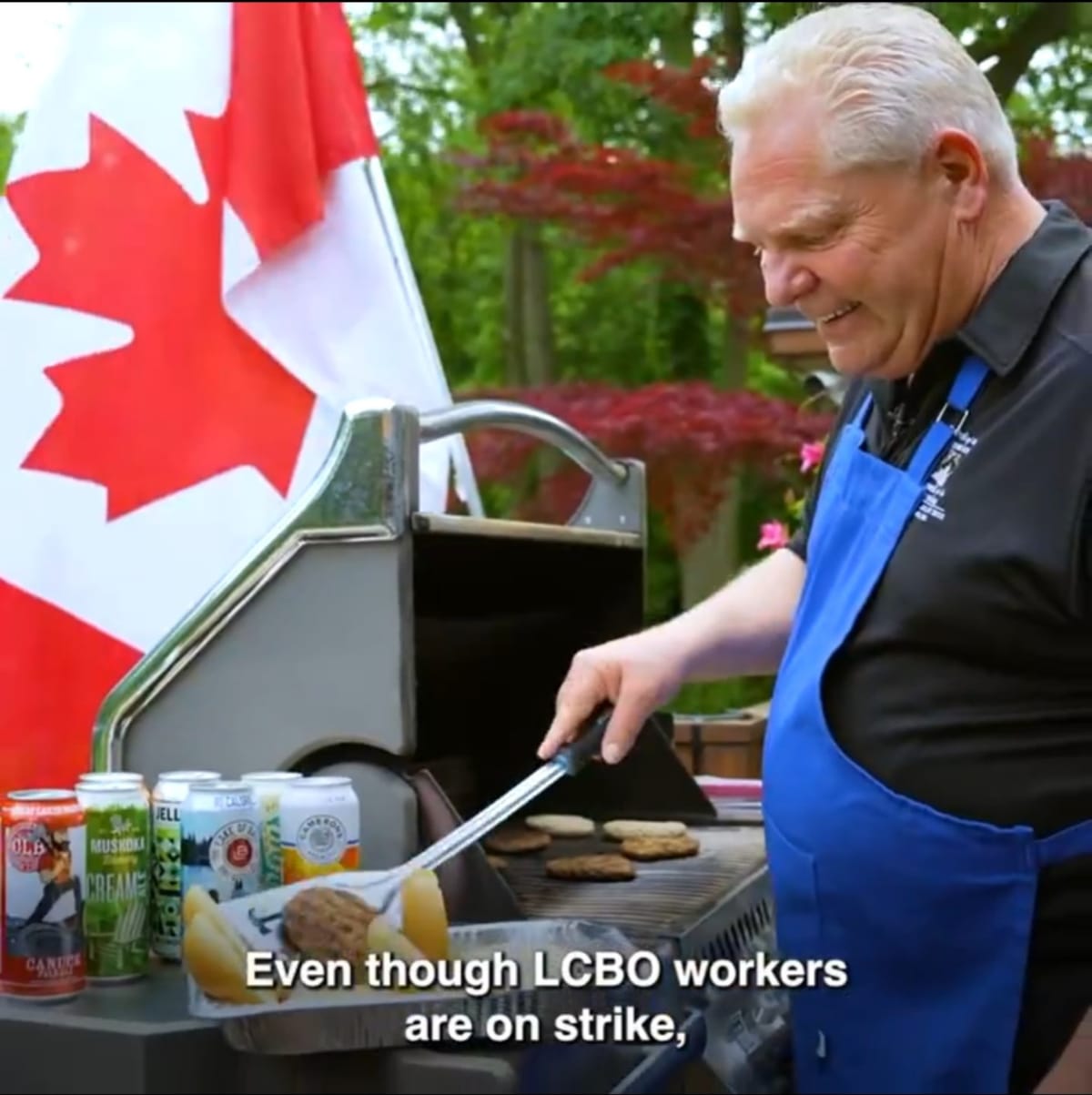
Friends, with the LCBO strike happening, we wanted to update this story for you. It was published over six months ago, when we had fewer subscribers, and it's become timely again.
We wrote this when the Ford government announced it would not be renewing the province's agreement with The Beer Store, which opened up 8500 new outlets (convenience stores, grocery stores, gas stations) to sell beer across the province.
As we wrote back then, the end game is ending the LCBO altogether, which will boost booze revenues for big box and grocery stores, and end all the unionized jobs at the LCBO. It will also put the LCBO distribution business to bars and restaurants up for grabs, which Walmart and Loblaws have both lobbied to take over. With a Weston on the board of directors of the LCBO, the conflict of interest is clear.
In terms of the bigger picture, getting rid of the LCBO will remove about $2.4B annually from provincial revenues, and ending government revenue streams has been a top priority for the Ford government as it moves the province ever closer to insolvency. The end goal of this financial ruin is privatization - once the province is too broke to fund healthcare, education, infrastructure, corrections and the rest, these services can be given over to the private sector to "save."
In May, the Ford government announced it would pay $225M to The Beer Store to allow corner stores and supermarkets to sell beer, wine and ready-made cocktails 16 months ahead of schedule. This means that 450 grocery stores which already have licenses for beer and wine sale can sell ready-to-drink cocktails by August 1, with the new outlets to follow on September 4.
This week, the reason for that timing became clear. Team Ford released a video on Twitter of Ford at his cottage, grilling up burgers and announcing an interactive map to let Ontarians know where else they can buy booze during the LCBO strike. This scabbing effort was then amplified and repeated by the Ford cabinet on social media. Making sure Ontario's drinkers don't miss the LCBO is meant to keep the workers out on strike for as long as possible.
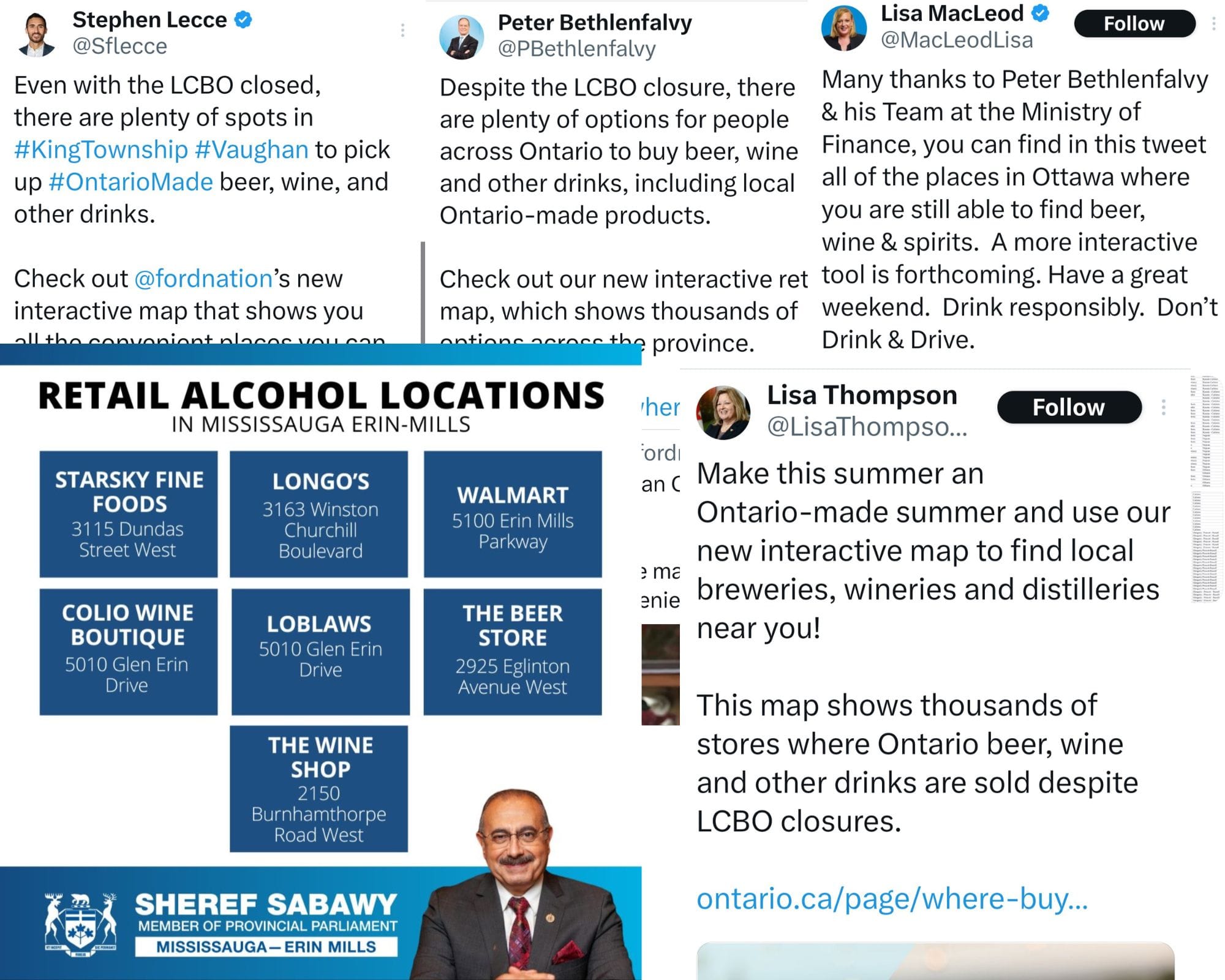
In a July 8th interview with CityNews, Finance Minister Peter Bethlenfalvy said he had "no idea" how much provincial revenue would be lost from the LCBO, and confirmed that the workers would not be legislated back to work, even though they were deemed an essential service during the early months of the pandemic.
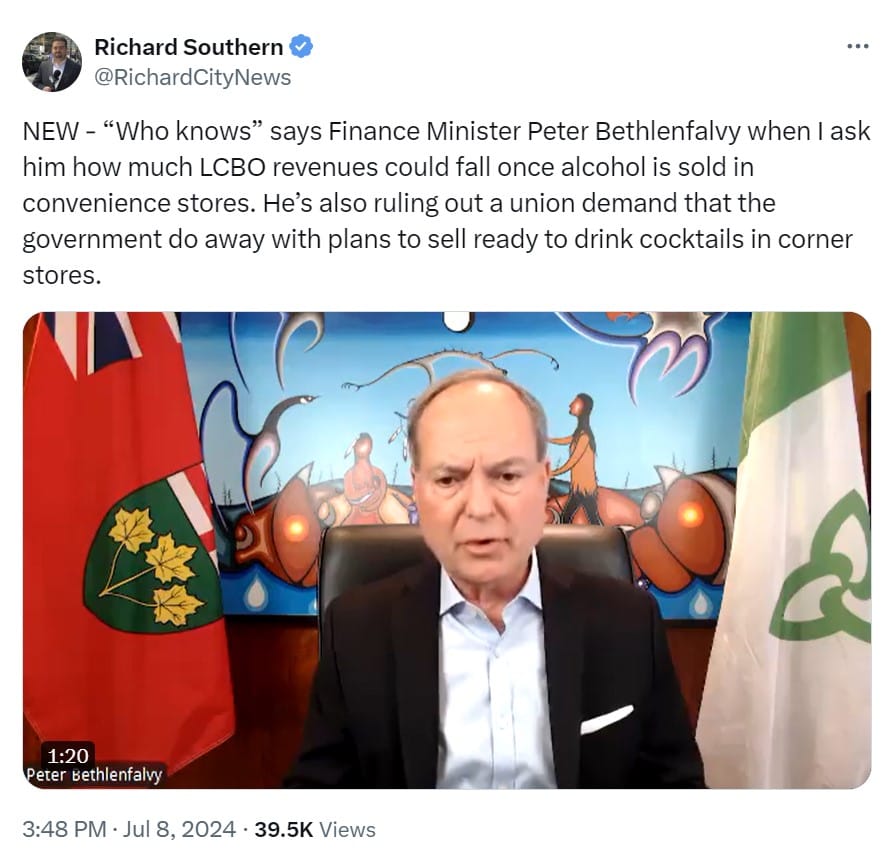
If Ford does plan to call an early election, which seems likely given relentless party fundraising, he will want to complete this promised gift of the LCBO to the big box players before dropping the writ, to make sure it gets done and ensure support (and donations) from them for the next election.
This article from back in January gives you an even bigger picture. (Psst, if you're enjoying our content, we're running a sale right now - current readers can subscribe for 40% off. Corruptario is 100% reader supported - paying subscribers help us keep our content free for everyone.)
Doug Ford has been obsessed with alcohol. On the campaign trail in 2018, Ford’s big promise was “buck a beer”, a gimmick that floundered months after his election. (Ford’s friends at Loblaws tried to help him out by offering its President’s Choice beer for a buck each, but it only lasted one week.)
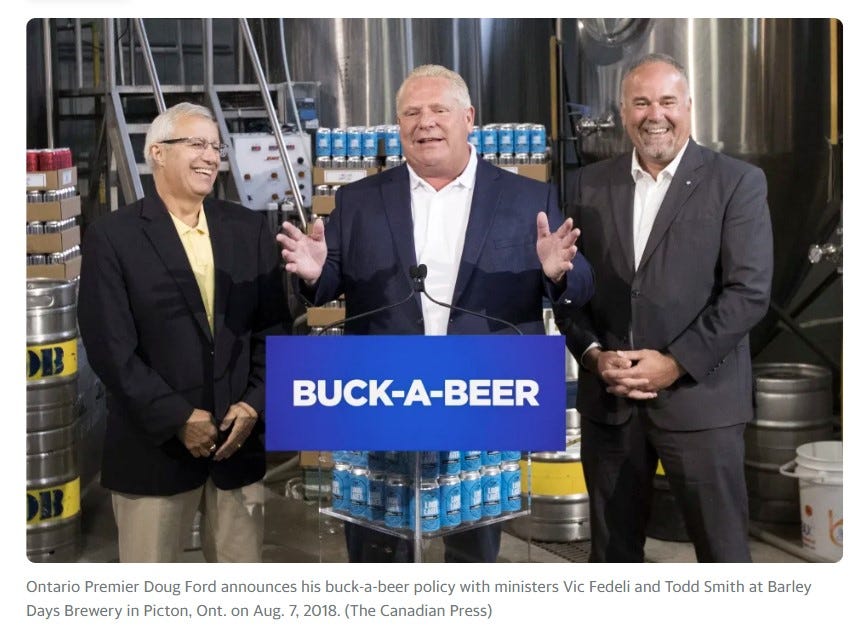
A year ago, Ford offered a generous gift to the Texas-based owners of 7-Eleven Inc. The company secured a liquor sales licence from the Alcohol and Gaming Commission of Ontario, permitting the company to serve alcohol with “indoor dining”, which means a beer or hard seltzer to wash down a weiner from the hot dog roller.
In December the Ford government announced its intention not to renew the “Master Framework Agreement” (MFA) which prevents anyone but The Beer Store from selling beer by the case. 8500 new outlets (convenience stores, grocery stores, big box stores and gas stations) will be able to sell beer in any volume, including cases. Private outlets can offer “competitive pricing” on beer, while prices at the LCBO will remain “consistent.”
Grocery store owners, convenience store owners and big box store owners benefit most from this move, which was clear from the industry voices pushing hard for it in the media. This includes the “Food Professor”, Sylvain Charlebois, a Dalhousie professor who serves as Canadian media’s go-to “analyst” on the grocery industry, and who reliably pushes corporate talking points at every opportunity.
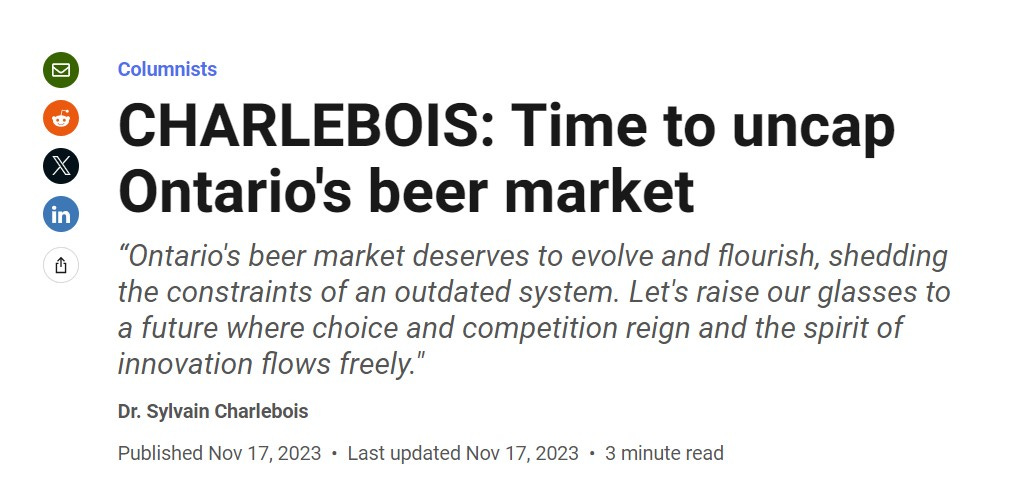
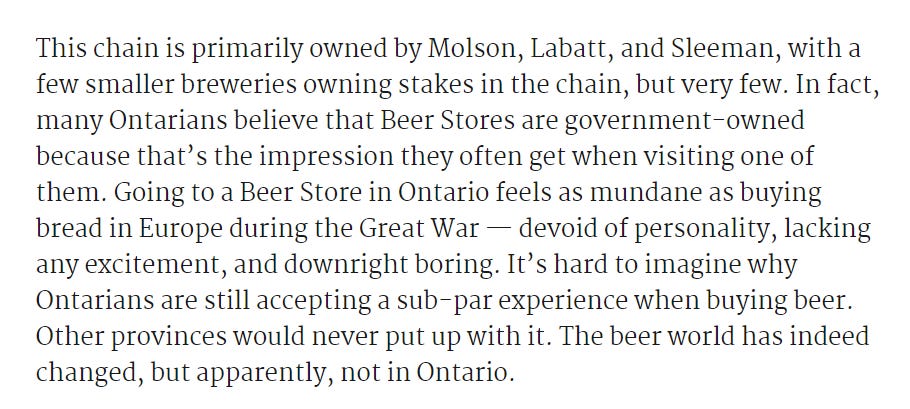
The lobby for convenience stores, the Ontario Convenience Stores Association, loudly applauded the move, having hosted Ford cabinet members posing awkwardly for photo-ops in convenience stores since 2019. With people spending less on lottery tickets and tobacco at the corner store, booze is seen as a way to increase revenue.
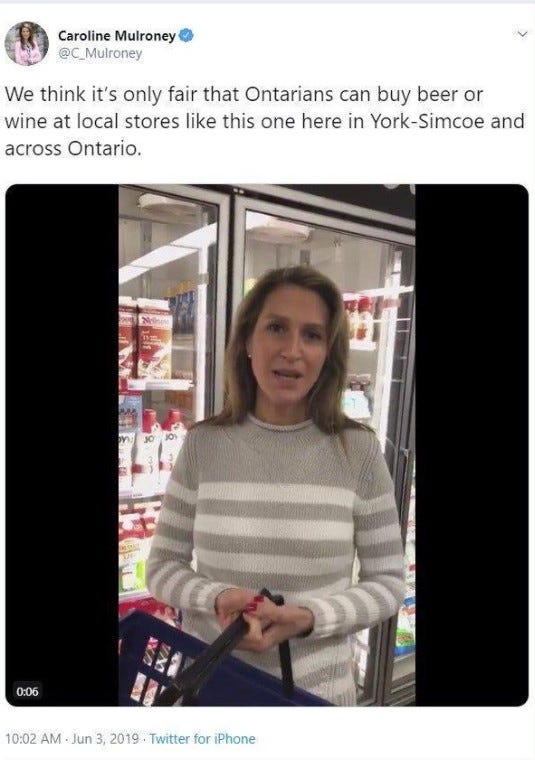
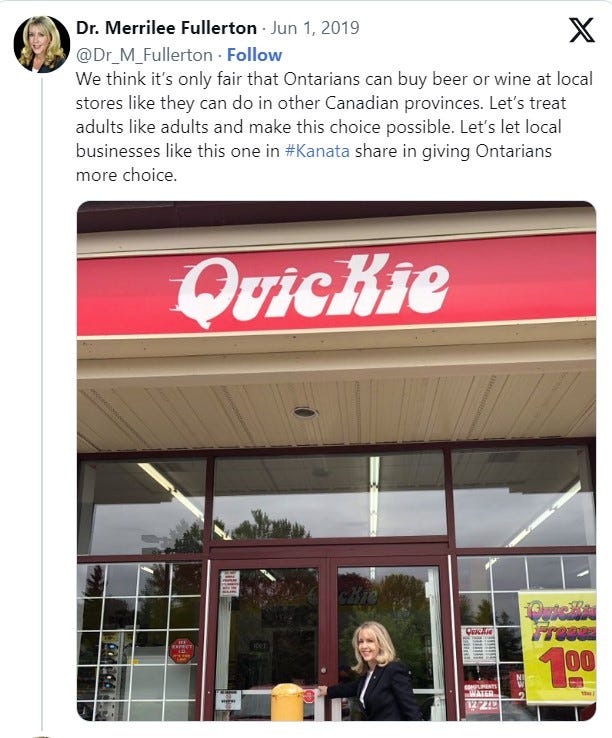
The Retail Council of Canada (whose board includes executives from Sobey’s, Metro, Loblaws’, Costco and Walmart) characterized the changes as a victory for the little guy against big business. Spokesperson Michelle Wasylyshen said, “The MFA has never been about choice, convenience or prices for customers; it has always been about serving the interests of the big brewing conglomerates.”
Having won this major battle for beer and wine revenue, Ontario’s big box stores and grocery stores will put additional energy into lobbying to sell spirits like gin, vodka and whiskey. “Hard liquor” is currently only sold at the LCBO or LCBO-licensed outlets. The inclusion of ready-to-drink products (like hard seltzer) in the announcement will help support industry’s argument that they should be allowed to sell all kinds of alcohol, because they are already selling products which include spirits.
The chains have also been lobbying for the right to be wholesalers and distributors of alcohol, taking advantage of their own integrated distribution systems and subsidiaries. Currently, only the LCBO and the Beer Store can run alcohol distribution in the province.
Now that all grocery stores can carry beer and wine, not just the 450 locations currency permitted, grocery chains will increase their revenue by taking business from the LCBO. The LCBO’s contribution to Ontario’s coffers is significant. The 2022/2023 annual report indicates a “record dividend” of $2.58B to the Government of Ontario to support “critical services like healthcare, education and infrastructure.”
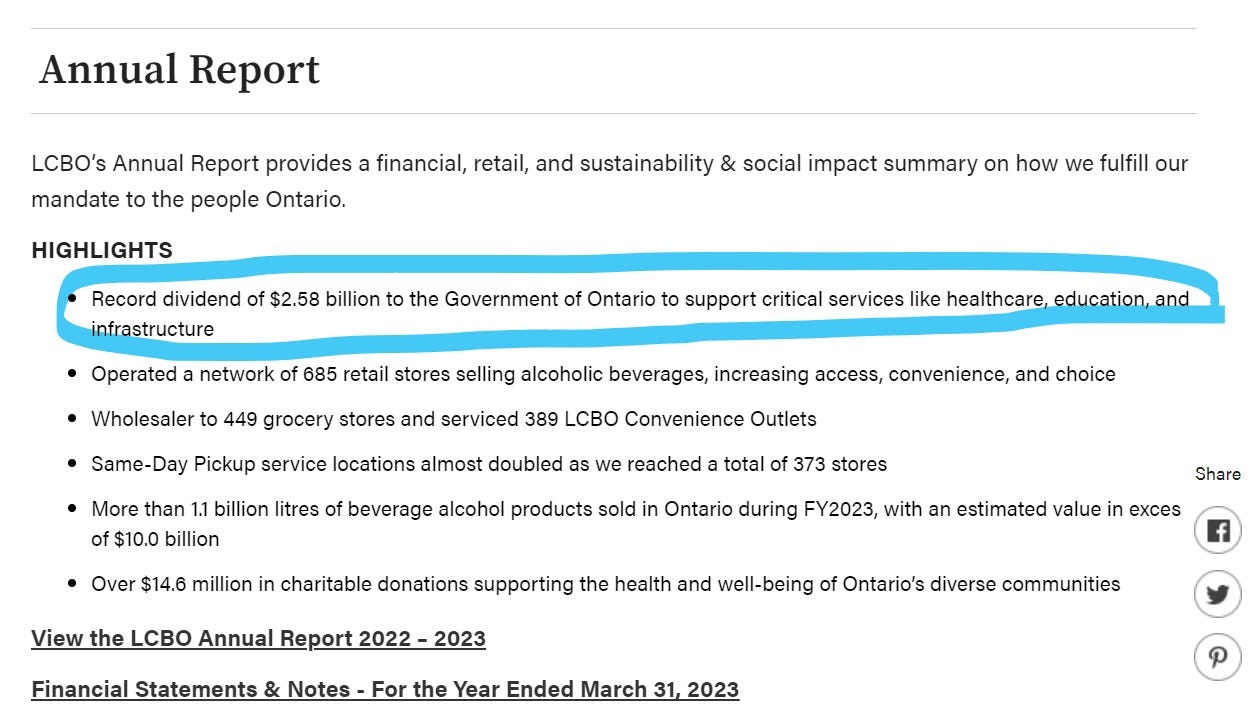
Coverage about the beginning of the end for The Beer Store touched very lightly on a major force behind the change, which is an ongoing effort to undermine organized labour. The Beer Store employs about 7,000 people in Ontario, 6,500 of whom are represented by United Food and Commercial Workers (UFCW).
At the time of the announcement, John Nock, president of UFCW Local 12r24, raised concerns about the impact on his members, as well as the Ontario Bottle Deposit Program, a deposit system created in 2007. The program, which sees Beer Store employees process and transport over a billion recyclable bottles a year, will expire in 2025 when the Master Framework Agreement expires.
The Ontario Public Service Employees Union (OPSEU), which represents LCBO workers, expects spillover consequences for its members. OPSEU president J.P. Hornick said: “The government’s plan will impact the LCBO; it will mean cuts, layoffs and store closures as the private market takes over, undercuts the public model, and eventually raises prices and profits. The end goal is clear: turn valuable public revenues into private profits. Period.”
Given that The Beer Store is governed by Ontario’s Liquor Control Act, and subject to pricing set by the Liquor Control Board of Ontario (LCBO), the LCBO had little to say about the announcement. Indeed, a number of media stories stipulated that the LCBO had been asked for comment but declined.

A closer look into the governance of the LCBO, via its board of directors, provides some clues on the LCBO’s direction and perspective.
Claudia Hepburn, who was appointed to the board of the LCBO in 2021, is Galen Weston’s first cousin. Galen Weston, of course, is the chairman of Loblaws’, and stands to benefit enormously from these changes. (Hepburn is the daughter of Wendy Weston, a sister of Galen Weston Sr. Claudia Hepburn is also a director for the family’s foundation, The W. Garfield Weston Foundation.)
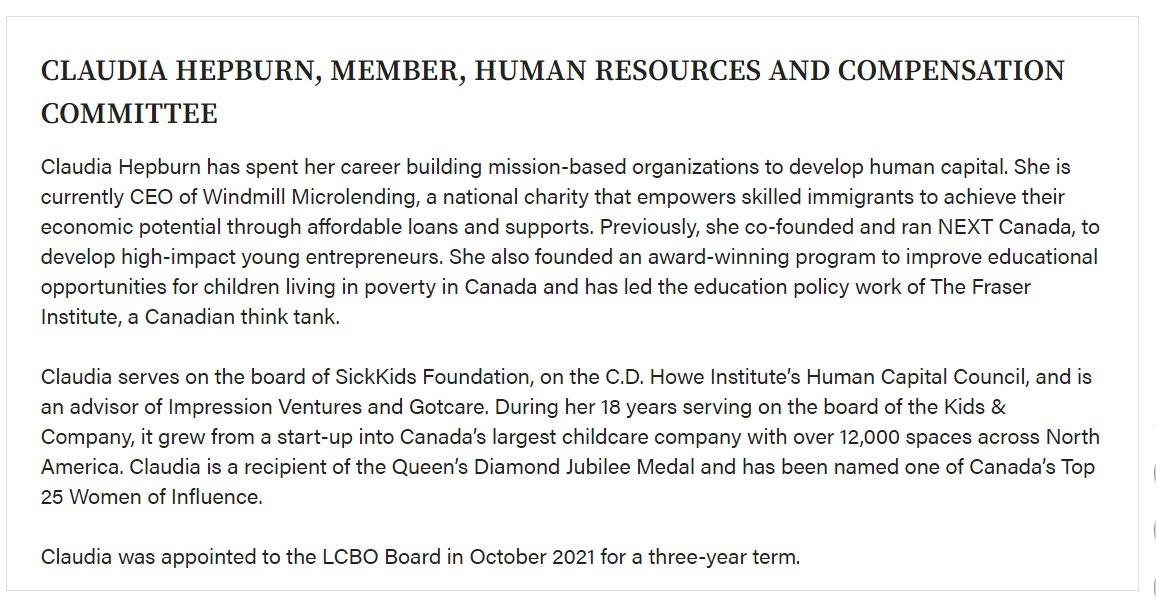
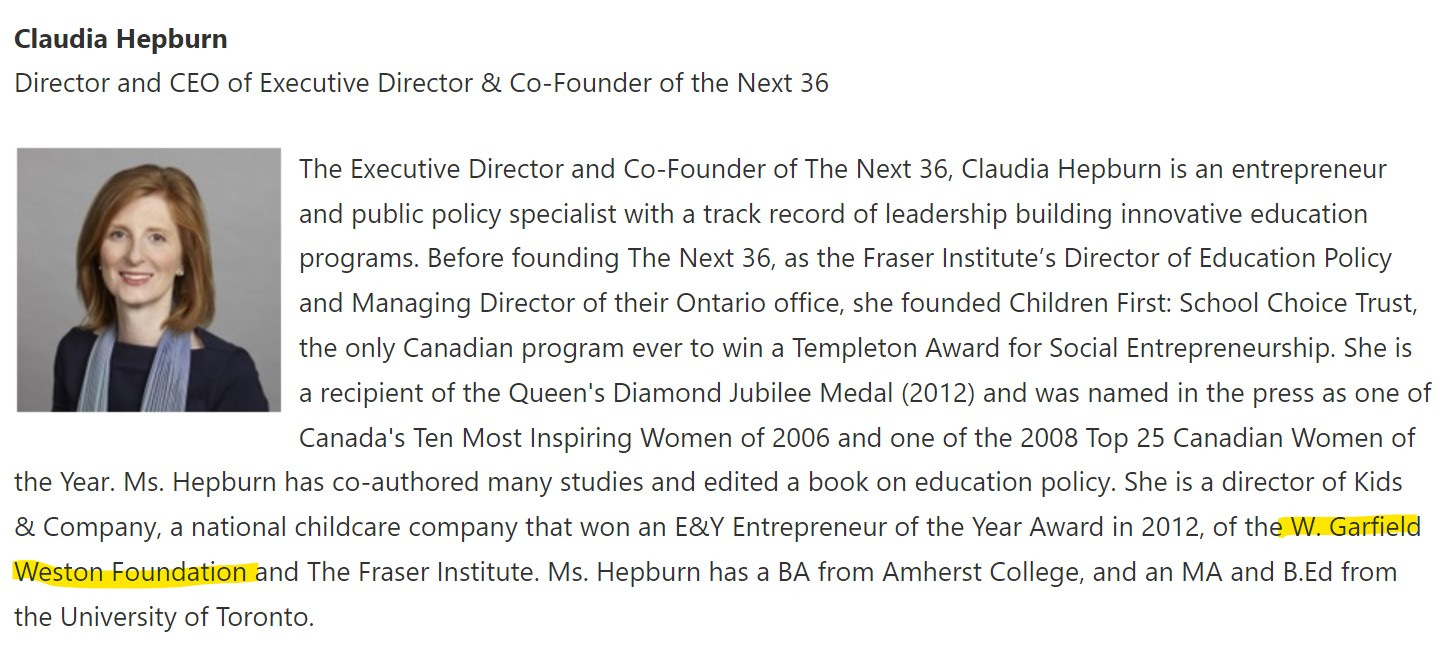
Chair of the LCBO since April 2019 has been Carmine Nigro, a developer (CEO of Craft Development) who was hosted at the premier’s table at Kayla Ford’s wedding reception. Nigro’s company benefited from a number of MZOs (or Ministerial Zoning Orders, which are fast tracked zoning approvals) from Ford’s government. Prior to MZOs being issued to his company, Nigro was also vice president of the PC Ontario Fund, a fundraising arm of the Ontario PC party. Nigro is also part of the controversial scheme at Ontario Place, as chair of the Ontario Place Corporation. (We wrote about Team Ford’s plans for their “spa” at Ontario Place last year.)
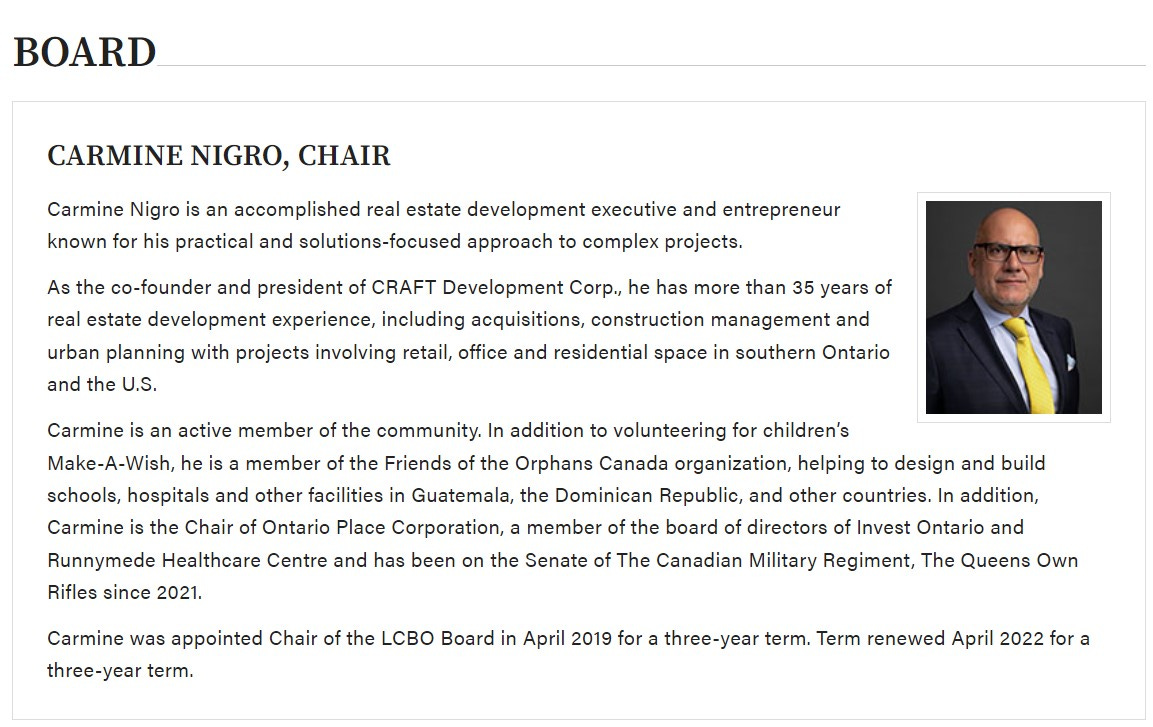
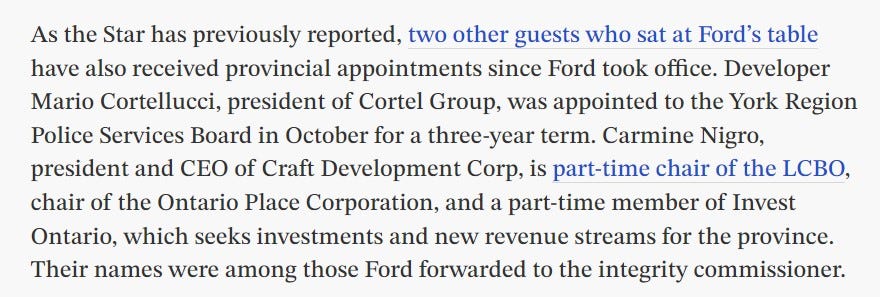
Other notable board members include:
- Quinto Annibale, a lawyer at Loopstra Nixon LLP, who was linked to Vaughan Working Families, a group that became the subject of an RCMP investigation after it violated election laws by publishing attack ads against striking teachers. On behalf of a group including Michael Rice of Rice Group and a number of members of the DeGasperis family, Annibale was enlisted to help turn a piece of agricultural land into developable property. He wrote to then-Minister Steve Clark requesting rezoning, and the government approved the request.
- David Colfer, renewed for a second term in 2022, is close friends with Dean French, Doug Ford’s ex-chief of staff. French was Team Ford’s liaison to the Freedom Convoy and was involved in a number of Ford controversies, including the appointment of Ford’s long-time friend, Ron Taverner, to head the OPP.
In alignment with other regions governed by IDU member parties, the Ontario PC party aggressively moved Ontario further into corporatocracy, with the goal of moving public funds (taxes) into private companies in order to generate private profits. Nearly all education and healthcare legislation passed since Ford’s election has intended to undermine public systems in order to benefit private, for-profit systems. (Bill 124, for example, was written to make sure hospitals could not offer raises and would lose staff to private agencies, which both undermines public hospitals and drives revenues to the owners of private agencies.)
Within this strategy, a key tactic is making sure government coffers are empty, so that government cannot provide services to its constituents, ensuring the only options for services are private ones. In that regard, the Ford government’s moves on alcohol sales are not only a gift to friends and donors in the private sector, and a way to reduce the influence of labour unions, but another nail in the coffin for Ontario’s government revenues.
Corruptario by Jordan Roberts & Friends is a reader-supported publication. To receive new posts and support my work, consider becoming a free or paid subscriber.
